Written by Nancy Miorelli
It’s been raining here for the past week and a half. I feel like I should have invested in an ark instead of a new computer.
And if you think I’m exaggerating (okay, but only slightly) we’ve gotten 5.57 inches of rain in the past week and a half and 6.79 inches during the month of April. Average rainfall for Athens in April is about 3.2 inches.. So yeah, it’s been wet.
So with the imminent next big flood, one of my students asked what bugs do in the rain. I thought this was nice since most people ask about birds; although there is no shortage of curiosity when it comes to their insect counterparts.
This is an important question as the cold temperatures can slow insects down, the water droplets add weigh to the insects and can make their wings stick together. Furthermore, high winds can easily push insects off course and they may have to expend more energy to stay on track. So to answer this we’ll have to consider a couple things.
- That bugs are exothermic (cold blooded)
- Their preferences and behaviors.
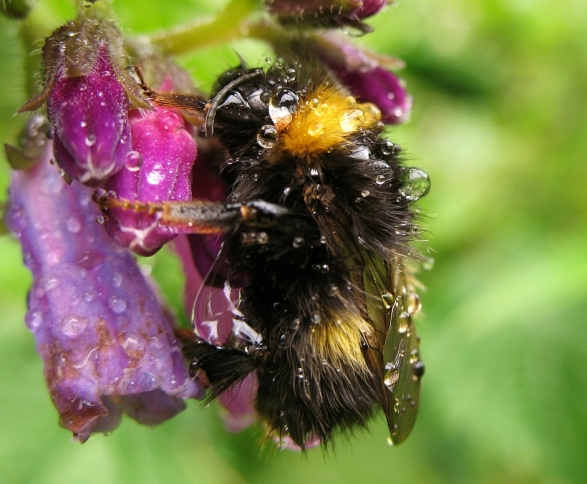
I’m cold. And wet. And I’m just gonna chill here until I dry out a little. Meh.
PC: Nutmeg66 (CC by NC ND 2.0)
Cold Blooded – But Not Cold Hearted
Insects are ectothermic and therefore their body temperature and activity is heavily influenced by their environment. So generally, the colder it is, the slower insects move and the warmer it is, the faster and more active insects are. However, if your life is completely dictated by the environment it makes it hard to exist for very long, especially if you’re a little insect. You don’t want to just be frozen in place every time an unexpected chill blusters by.
So insects have some tricks up their sleeves to help them deal with the inclement weather.
If bees get too cold, they’ll huddle together and shiver – just like us – to keep themselves warm. Queen bumblebees disengage their wings and use the flight muscles to generate heat to help them forage for food in the early, chilly spring.
And some arthropods simply have antifreeze proteins to help them when it gets extremely cold – like this snowflea that cheerily hops along snow banks in sub zero temperatures.
But if it’s raining, it’s probably not below freezing. So what do insects do in the rain?
That varies considerably based on the insect and their behavior.
Staying In
Many insects can sense atmospheric pressure differences. Honey Bees for instance, just stay home if they sense a storm coming. Other bees, like Mason Bees may stay out and forage in light rain but will take shelter when it starts raining too heavily or the wind gets too intense.
Since the water can weigh them down, it’s harder for insects to fly when it’s cold and the rain can damage their wings, many insects just seek shelter. After a particular rainy afternoon in Ecuador, I looked under a small leafy plant and found several butterflies, hunkered down, just waiting for the storm to pass.
Also, after a particularly wet morning, I found some Red Flat Bark Beetles (Cucujus clavipes) hiding away under some bark, clearly disgruntled that I disturbed their slumber.
Out Past Curfew
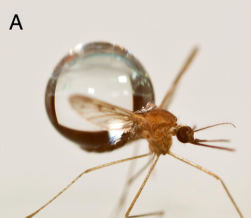
Raindrop size in relation to a mosquito.
PC: Dickerson et al. 2012
Small insects that thrive in warm and humid areas fly in the rain anyway. Mosquitoes, in particular, were studied to determine how they can resist the rain. For the most part, they’re just small and many raindrops don’t hit them. If they are hit by the raindrops, the mosquitoes just kind of become assimilated into it and fall with the raindrop. They then escape the falling raindrop with the help of their water resistant hairs. Every mosquito in this experiment managed to escape the water droplets.While we don’t really have the answers, it’s assumed that other small, flying, and agile insects do the same.
Being able to stay active when other insects are not reduces competition. There are lots of other insects that would like to blood feed on humans and other animals, so being able to stay out in conditions when others can’t, allows you to feast. You snooze you loose … literally.
Just Waiting for the Party
Some insects specifically wait for the rain to complete their reproductive cycles. The winged reproductives of a leafcutter ant in Texas fli]y just after rain on moonless nights in the early spring.
Rain beetles are another group that specifically wait for the rain. They live underground and during the rain, the females will come to the surface of their burrows and release pheremones. The males, also aware of the rain, escape their soil forts and fly to the find the females in the very early morning. By following the pheromone trail, the males find a female’s burrow and mate with her, where she then lays eggs, and they all live underground again until the next rainy winter.
TL;DR
Depends on the insect. Some wait for the storm to pass, some don’t go out at all, some just dodge the raindrops or escape them, and others specifically wait for the rain to get their funk on. Also, as a short aside, there are lots of insects just live in water, in which case, the rain doesn’t really affect them.
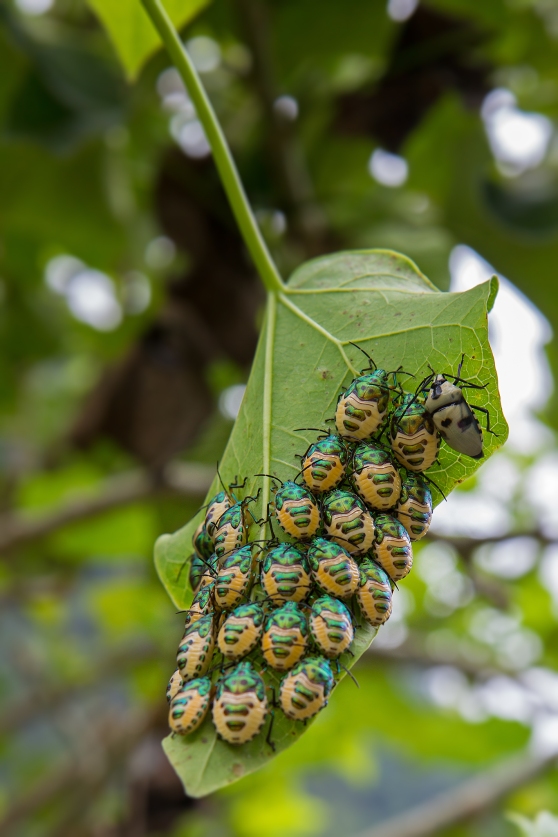
These Shield Bug nymphs don’t wanna go out there with the weather like that!
PC: Peter Nijenhuis (CC by NC ND 2.0)
References
-
Dickerson AK, Shankles PG, Madhavan NM, Hu DL. 2012. Mosquitoes survive raindrop collisions by virtue of their low mass. PNAS 109(25): 9822-9827.
-
Pellegrino AC, Peñaflor MFGV, Nardi C, Besner-Kerr W, Guglielmo CG, Bento JMS, McNeil JN. 2013. Weather forecasting by insects: Modified sexual behavior in response to atmospheric changes. PloS One DOIL 10.1371/journal.pone.0075004.


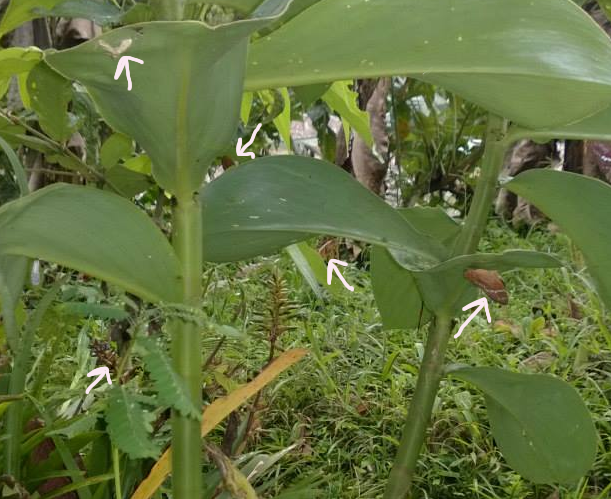
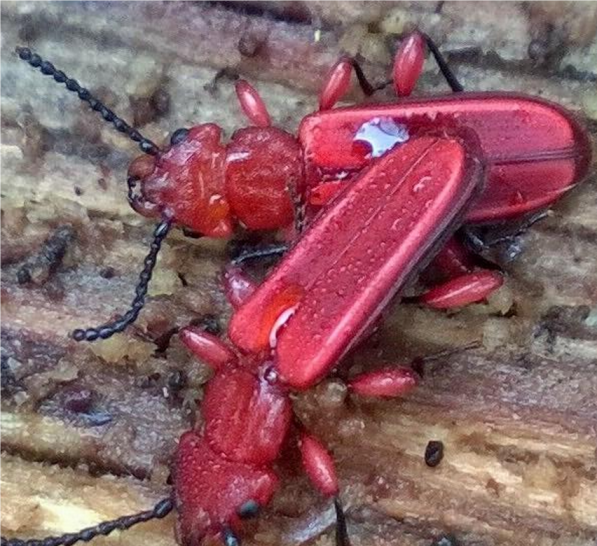

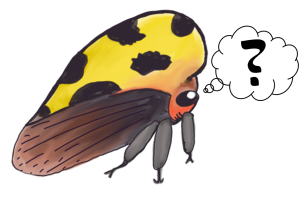
Pingback: Links 5/8/15 | Mike the Mad Biologist
Pingback: Are Anthills Waterproof? | Ask an Entomologist
Question: Is it true that very small insects (e.g., ants) can get trapped inside water drops due to the high surface tension forces of water?
LikeLike
Pingback: What have we learned about science communication over the past year of answering your questions? | Ask an Entomologist
Great article. It answers a lot of questions, while still leaves some ideas in the open. I mean, I don’t want to know everything about insects, but I was wondering whether there is a complete genocide of these little creatures every time it rains. According to this article, not, but I guess many of them still die…
LikeLike
Not many insects would die in the rain. Think about it, rain happens all the time. It wouldn’t be evolutionary adaptive if you could die every time there was a little bit of rain.
LikeLike
Pingback: Do insects get trapped in water drops? Why aren’t they constantly drowning? | Ask an Entomologist
Pingback: Orlando Pest Control Experts Discuss Weather & Pest Problems
Pingback: Prepping for Bugs & Rainy Season | Arrow Exterminating
Pingback: Hole-Diggers and Log-Lookers – Jackie Quiring